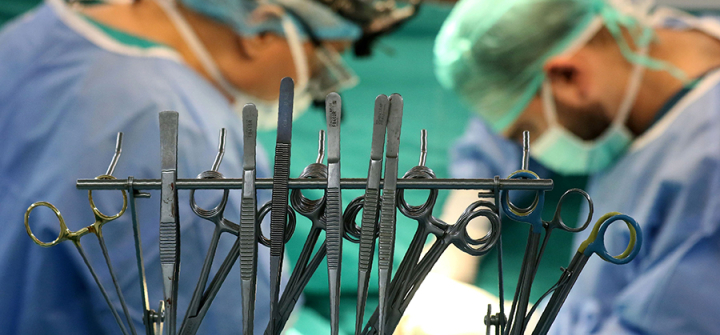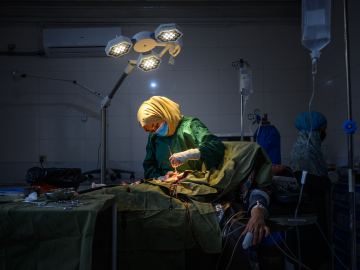Do We Have a Right to Surgery? The Case for Access to All
Sweat poured down Fenol’s body as he writhed in pain on a stretcher in a southern Haiti emergency room. Two days earlier, a motorcycle crash caused massive trauma to his abdomen. His internal injuries had precipitated multi-organ failure and shock, and he had lost precious time searching desperately for a hospital with surgical capacity. His pain, fear, and mortal predicament was borne from a violation of what we believe is a fundamental human right: he had no access to essential, life-saving surgery.
What does Fenol’s predicament have to do with human rights, and why do we believe that surgery is a right? Surely, we can all agree that as humans and global citizens we are inherently entitled to the right to liberty and freedom. These ancient concepts took root with the first civilizations and have now flourished and grown into a system many trust and hold dear: democracy.
But what about the right to water, food, shelter, and even health care? Are these basic human rights? Or simply luxuries for those who can afford it?
We argue that yes, these are fundamental rights for all people, and as such warrant protection. The saying goes, “Health is wealth.” But it should be “Health is life.” What value is one’s freedom if they are sick, disabled, debilitated, and not able to live life to its fullest? Even Thomas Jefferson, one of America’s Founding Fathers, must have recognized that the “pursuit of happiness” necessitates an able body and mind. All these rights are synergistic, and meaningless without each other.
To that end, many policymakers, researchers, healthcare providers, and global leaders work tirelessly to end poverty and deliver basic healthcare to those who need it most, as evidenced by the establishment of the UN Sustainable Development Goals. Thankfully, progress has been made. The UN estimates that since 1990, a billion people have been lifted from poverty and child mortality has decreased by more than half.
However, in a recent article published in Human Rights Quarterly, Lauren Eyler and colleagues argue that these efforts are missing a key piece: surgery. Studies show that one third of the world’s burden of disease can be treated with surgery, and yet 70% of the global population lacks access to surgical care.
This tragic disparity is the result of longstanding myths surrounding surgical care.
In the past, treatment strategies heavily prioritized infectious diseases over noncommunicable or chronic diseases. Many believe that HIV/AIDS, malaria, and other infectious diseases contribute more to disability-adjusted life years (DALYs), which can be thought of as “years of ‘healthy’ life lost.” In fact, 65% of DALYs are due to noncommunicable diseases—many of which require surgical treatment.
It is also widely believed that treating surgical diseases is extraordinarily expensive. The World Health Assembly Resolution 68.15 argues otherwise, stating, “strengthening emergency and essential surgical capacity together with anesthesia… is a highly cost-effective solution.” Perhaps surprisingly, many surgical procedures are cheaper, based on the cost of averted DALYs compared to chronic conditions like heart disease and HIV/AIDS. It is estimated that each dollar spent on surgical systems leads to $10 gained through increased productivity and population health.
Finally, surgery has been considered too complex of an intervention for resource-poor settings. The global health field has historically focused on building “vertical” programs designed to buttress only the parts of a health system needed to treat an individual disease like polio or malaria. Creating surgical capacity requires us to rethink this approach. Surgery needs a functioning hospital, meaning that systems must be built from the ground up to care for the wide spectrum of surgical patients. We find that this approach strengthens the entire hospital and health system significantly, improving health care quality and capacity across the spectrum.
To protect the right to surgery and ensure that everybody has access, we need a concerted effort across all levels of global health, from individuals to international multilateral organizations. Donors and advocates need to support and promote organizations commited to building local surgical capacity in resource-poor settings. Large-scale international organizations like the WHO, World Bank, and universities need to support and facilitate national surgical planning by local governments and health ministries.
Fenol died that day because surgery is thought to be low-yield, difficult, and prohibitively expensive. Every year, millions across the world suffer the same fate because the right to surgery has been ignored. However, momentum is gathering to change this paradigm, and everyone has a role to play in promoting better health across the world.
Rolvix Patterson, BA is a medical and public health student at Tufts University School of Medicine and a Research Associate at Harvard’s Program for Global Surgery and Social Change. Follow him on Twitter @RolvixPatterson.
Jacquelyn Corley, MD is a neurological surgery resident at Duke University Medical Center, Paul Farmer Research Fellow at Harvard’s Program for Global Surgery and Social Change (@HarvardPGSSC), and a human rights journalist focusing on health-care-related topics. Follow her on Twitter @JacquelynCorley.
Join the tens of thousands of subscribers who rely on Global Health NOW summaries and exclusive articles for the latest public health news. Sign up for our free weekday enewsletter, and please share the link with friends and colleagues: http://www.globalhealthnow.org/subscribe.html
Operating tools are seen as pediatric heart surgeon Issam al-Rassi performs a heart operation on 9-month-old Syrian refugee Amena al-Helou at the Hammoud Universal Hospital in Sidon, Lebanon, Sept. 2016. Image: Mahmoud Zayyat/AFP/Getty Images




